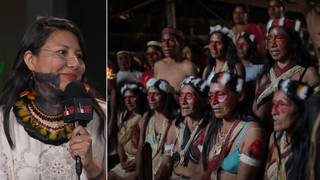
Guests
- Kirk Kolbolead counsel for the Center for Individual Rights who argued against affirmative action in front of the Supreme Court yesterday.
- Miranda Massielead attorney for the student defenders in the University of Michigan Law School Case.
- Agnes AleobuaUniversity of Michigan student.
With thousands of protesters outside, the Supreme Court began hearing arguments on two landmark cases that will likely decide the future of affirmative action.
The stakes are high. The court could prohibit affirmative action programs at all universities, public and private, across the country. The court could allow the programs to continue. Or, the court could pronounce new standards for evaluating programs on a case by case basis.
The New York Times reports it appears based on yesterday’s proceedings that affirmative action will survive its most important test in 25 years.
Most notably, Justice Sandra Day O’Connor, who is widely viewed as holding the likely swing vote in the decision, raised a series of skeptical questions to the lawyers arguing against affirmative action.
The Court is hearing a pair of cases involving the admissions policy of the University of Michigan. The case names are Grutter v. Bollinger and Gratz v. Bollinger.
Grutter is a challenge to the university’s law school admissions program, which gives African-American, Latino and Native American applicants a loosely defined special consideration to ensure that there is a “critical mass” of such students in each new class.
Gratz is a challenge to the university’s undergraduate admissions policy, which tries to ensure a “critical mass” of African-American, Latino and Native American enrollments by giving such applicants an automatic 20-point bonus on the school’s 150-point “selection index.”
Let’s begin by hearing some of yesterday’s arguments. This is an excerpt of Justices Sandra Day O’Connor and Anthony M. Kennedy quizzing Kirk O. Kolbo, the attorney for the plaintiffs in Grutter v. Bollinger, which challenges the University of Michigan Law School’s affirmative action program.











Media Options